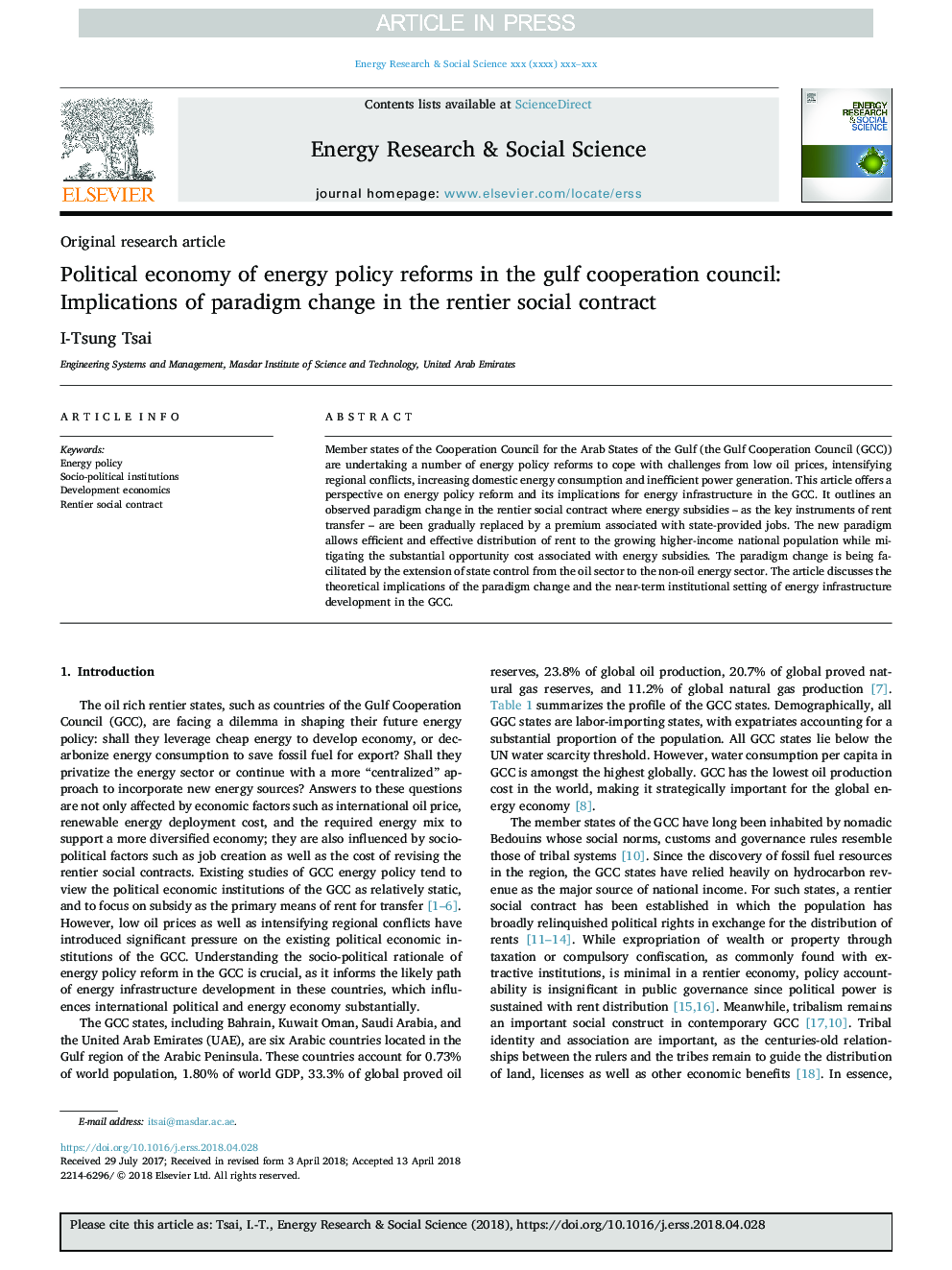| کد مقاله | کد نشریه | سال انتشار | مقاله انگلیسی | نسخه تمام متن |
|---|---|---|---|---|
| 6557398 | 1422560 | 2018 | 8 صفحه PDF | دانلود رایگان |
عنوان انگلیسی مقاله ISI
Political economy of energy policy reforms in the gulf cooperation council: Implications of paradigm change in the rentier social contract
ترجمه فارسی عنوان
اقتصاد سیاسی اصلاحات سیاست انرژی در شورای همکاری خلیج فارس: پیامدهای تغییر پارادایم در قرارداد اجتماعی رانتیر
دانلود مقاله + سفارش ترجمه
دانلود مقاله ISI انگلیسی
رایگان برای ایرانیان
ترجمه چکیده
کشورهای عضو شورای همکاری برای کشورهای عربی خلیج (شورای همکاری خلیج فارس) در حال انجام تعدادی از اصلاحات سیاسی انرژی برای مقابله با چالش های قیمت پایین نفت، تشدید اختلافات منطقه ای، افزایش مصرف انرژی داخلی و قدرت ناکارآمد نسل. این مقاله چشم انداز اصلاح سیاست های انرژی و پیامدهای آن برای زیرساخت های انرژی در شورای همکاری خلیج فارس را ارائه می دهد. این یک تغییر پارادایم مشاهده شده در قرارداد اجتماعی رانتیر را نشان می دهد که در آن یارانه های انرژی - به عنوان ابزار اصلی انتقال اجاره - به تدریج جایگزین حق بیمه در رابطه با مشاغل دولتی شده است. پارادایم جدید اجازه می دهد تا توزیع سودمند و موثر اجاره به جمعیت رو به رشد جمعیت با درآمد بالا، در حالی که کاهش هزینه های احتمالی فرصت های مرتبط با یارانه های انرژی کاهش می یابد. تغییر پارادایم توسط گسترش کنترل دولت از بخش نفت به بخش انرژی غیر نفتی تسهیل می شود. در مقاله، مفاهیم نظری تغییر پارادایم و تنظیم نهادهای سازنده در زمینه توسعه زیرساخت های انرژی در شورای همکاری خلیج فارس بحث می شود.
موضوعات مرتبط
مهندسی و علوم پایه
مهندسی انرژی
انرژی (عمومی)
چکیده انگلیسی
Member states of the Cooperation Council for the Arab States of the Gulf (the Gulf Cooperation Council (GCC)) are undertaking a number of energy policy reforms to cope with challenges from low oil prices, intensifying regional conflicts, increasing domestic energy consumption and inefficient power generation. This article offers a perspective on energy policy reform and its implications for energy infrastructure in the GCC. It outlines an observed paradigm change in the rentier social contract where energy subsidies - as the key instruments of rent transfer - are been gradually replaced by a premium associated with state-provided jobs. The new paradigm allows efficient and effective distribution of rent to the growing higher-income national population while mitigating the substantial opportunity cost associated with energy subsidies. The paradigm change is being facilitated by the extension of state control from the oil sector to the non-oil energy sector. The article discusses the theoretical implications of the paradigm change and the near-term institutional setting of energy infrastructure development in the GCC.
ناشر
Database: Elsevier - ScienceDirect (ساینس دایرکت)
Journal: Energy Research & Social Science - Volume 41, July 2018, Pages 89-96
Journal: Energy Research & Social Science - Volume 41, July 2018, Pages 89-96
نویسندگان
I-Tsung Tsai,
